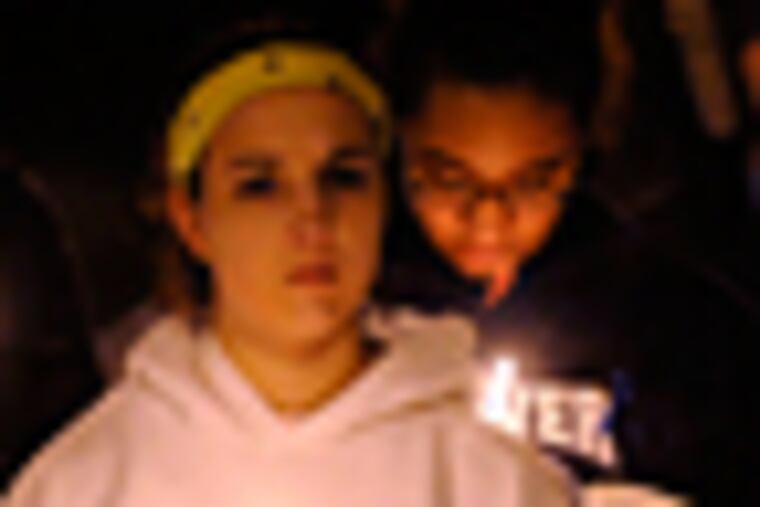Penn State board does Sunshine Act 'cure'
A brief conference call legally resolved questions over firings not given a public vote.

STATE COLLEGE, Pa. - Three weeks ago, Pennsylvania State University's board of trustees met hurriedly to fire longtime football coach Joe Paterno, accept president Graham B. Spanier's resignation, and name provost Rodney Erickson as the university's new president.
But questions arose about whether the board had complied with the state's Sunshine Act, because there was no evidence of required public votes on the matters. So the executive committee - nine of the 32 board members - decided to hold a brief telephone conference call Friday morning to resolve questions and formally approve those three major decisions.
The changes in status for Spanier, Paterno, and Erickson were the result of the questionable handling of child-sexual-abuse allegations against former assistant football coach Jerry Sandusky, whose arrest came five days before the departures of Paterno and Spanier.
Both men had faced growing criticism over the university's failure to report to law enforcement authorities allegations that Sandusky sexually assaulted a boy in a locker-room shower of the Lasch football building on campus in 2002.
"Due to the extraordinary circumstances" during the week of Nov. 6, Penn State spokesman Bill Mahon said after the executive committee's five-minute phone call, "the board of trustees needed to act swiftly and decisively regarding personnel. While the board believes immediate action was necessary [three weeks ago], it is holding this special, preannounced public meeting of the executive committee to reaffirm and ratify the board's prior personnel decisions."
He added that the trustees "wanted to dot all the I's and cross all the T's."
He said the firing, the resignation, and the naming of the new president were effective the week of Nov. 6. The full board will meet in January to "reaffirm" the action taken by the executive committee Friday, he added.
Melissa Melewsky, media law counsel for the Pennsylvania Newspaper Association, said later Friday that the Penn State trustees "took advantage of a court-made remedy known as a 'cure.' "
Agencies subject to the Sunshine Act, Melewsky said, "can remedy an alleged violation of the act if they redo the suspect action at a properly advertised public meeting. It's a 'do-over.' It's not an unusual thing for an agency to do when there is an allegation of Sunshine Act problems. Courts have allowed agencies to participate via conference call."
"Given the extraordinary circumstances," added Christopher Borick, a professor and pollster at Muhlenberg College, "the university was called to act quickly [three weeks ago], and they very well may have failed to follow the letter of the law in terms of the Sunshine Act and public notice. What they did [Friday] was make sure the legal requirement [for notice] was met."
When asked whether the trustees had violated the Sunshine Act three weeks ago, Mahon said, "I can't speculate on that." He also refused to discuss the status of former athletic director Tim Curley, who is on leave after being charged with perjury in the Sandusky case. Curley is due in court Dec. 16, along with former university vice president Gary Schultz, also charged with perjury.
Borick, a 1987 Penn State graduate, said he wondered if Spanier or Paterno "might feel harmed or wronged" by the board's action and "take up some legal challenge. But the answer very likely is no. I don't think Joe Paterno would want to use this [Sunshine Act issue] to challenge the board's decision. He's not going to use this to try to get his job back."
Spanier is a tenured professor, but has decided to take a year's leave of absence from the classroom, Mahon said. He said he wasn't sure whether Paterno, also a tenured faculty member, might want to teach.
Mahon said the trustees had used the conference-call procedure a couple of times in recent years. One was three years ago, when the state Legislature did not approve a state budget until October. The executive committee approved the school's budget and set tuition rates, which were later reaffirmed by the full board.
The resolutions about Spanier and Paterno had somewhat different language, but board chairman Steve Garban said later, "I don't know of any particular significance" in that. The Spanier resolution said that "in view of the situation and the unfolding circumstances, the board determined it was best for Dr. Spanier to step down as president effective Nov. 9."
About Paterno, the resolution said it was "in the best interest of Penn State that [he] no longer serve as head football coach effective Nov. 9."
The Pittsburgh Post-Gazette and others had raised questions about whether the Paterno and Spanier moves were lawfully made.